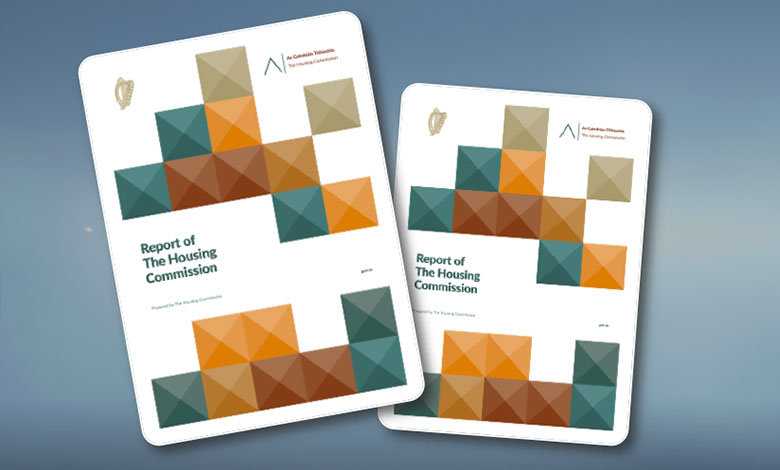
The state of the private rental market
7th November 2024
Ensuring the success of compact development in Ireland: Research by The Housing Agency
7th November 2024Housing for All delivery revision delayed

The publication of a revision of Housing for All, which had been expected to update the Government’s housing supply target, has been delayed and will likely not be published until after the 2024 general election.
The update to Housing for All was expected to account for new delivery targets recommended following reviews by the Economic and Social Research Institute (ESRI), the Report of The Housing Commission, as well as an update to the draft revision of the National Planning Framework, which both recommend that the Government’s housing delivery targets increase to account for higher-than-expected demand.
The Department had been expected to publish its housing delivery revision at the end of October, but this has not taken place and there is no indication that this will take place prior to the calling of a general election, with the Dáil expected to be dissolved by 8 November at the latest.
Speaking to eolas Magazine, a spokesperson from the Department of Housing, Local Government and heritage said that the delayed update to Housing for All is “being finalised”, and “will be published in due course”, while saying that the Department is not prepared to comment on when the update will be published.
Speaking to eolas Magazine in June 2024, Minister Darragh O’Brien TD said there will probably be upward revision of the Government’s housing targets.
While O’Brien said that “targets have never been the ceiling”, and have instead “been the floor”, he specified that “it is important that we reset [delivery targets] based on the increasing population”.
Sinn Féin spokesperson on Housing, Eoin Ó Broin TD accused the Minister of “what looks like a massive U-turn”, which he said was “hard to understand given the fact that the data on which the new targets should be set was published by both the ESRI and The Housing Commission months ago”.
Ó Broin further accused the Minister of wanting to make it to the general election without publishing the new figures: “What is the Minister hiding? What does he not want the voters to see? Is it that he knows he cannot significantly increase the targets for social and affordable homes and now wants to conceal that fact from the electorate,” he said.
Revision of housing targets
Three recent publications – two designed to inform government policy and one draft revision of government policy – have recommended an upward revision of the Government’s housing delivery targets.
The Report of The Housing Commission, released in May 2024, asserts that there is an existing housing deficit of 235,000 units which should be resolved by 2034. This would require building numbers to increase by an average of 50 per cent per annum in comparison with current numbers. The Commission further recommends that this could be enabled by the establishment of a housing delivery oversight body.
Alongside the existing housing deficit and future demand, the Commission also notes that, while the Government did deliver 32,000 new homes in 2023, that this is set against a backdrop where housing supply previously peaked at close to 90,000 in 2007.
The ESRI’s report, Population projections, the flow of new households and structural housing demand, published in July 2024, has revised figures set out in 2020 by the ESRI which informed the targets set by the Government under Housing for All.
The report determines that between 35,000 and 53,000 new dwellings will need to be constructed per annum by 2040, considering different models of population projections, the projected structure of households, and future economic growth.
The draft First Revision to the National Planning Framework (NPF) – the planning framework for socioeconomic and cultural development of the State out to 2040 – anticipates the need for ~50,000 additional homes each year.
Published for public consultation on 10 July 2024, the draft review intends to update the NPF to reflect changes in government policy, not least in climate action, regional development, demography, and digitalisation. With the consultation having closed in September, O’Brien had previously told eolas Magazine that he wanted to see the revised NPF “implemented in September [2024]”.
General election
At the time of writing, it is not yet clear when the election will be called, although Taoiseach Simon Harris TD and Tánaiste Micheál Martin have said it will be before the end of 2024, and Green Party leader Roderic O’Gorman TD has said it will likely be held on 29 November, which means that 8 November is a likely date for the dissolution of the Dáil.
Housing was the dominant topic in the 2020 election, and led to neither Fine Gael or Fianna Fáil winning the popular vote for the first time in the history of the State, which meant that when the two parties – along with the Green Party – coalesced for the first time, housing became a priority challenge for the Government.
Temporary measures, such as the eviction bans over Covid and the two following winters amid the inflation crisis, proved popular with the public and delivered results by the way of homelessness reductions when they were in place.
The underlying challenge to Ireland’s housing crisis has always been supply challenges. These emanate from a number of key areas, namely that there has been a shortage in construction workers since the Great Recession and collapse of the Irish housing market in 2007.
Housing delivery numbers remain just over one-third of what was delivered in 2007, in spite of the significant increase in demand. While the Government’s Budget 2025 housing measures are specifically targeted towards supply increases, the results of these policies are unlikely to be felt in the short term, meaning that housing is a topic of public discourse which is not going away anytime soon.






